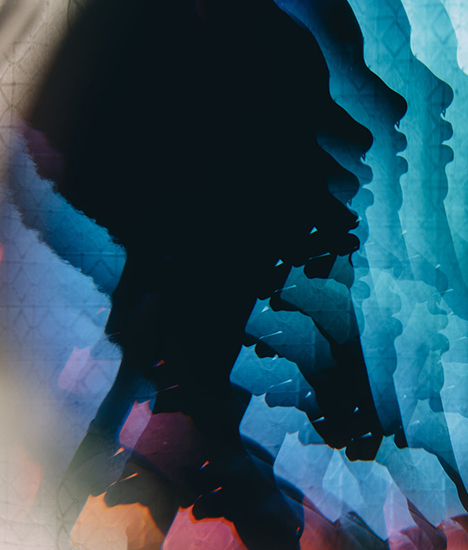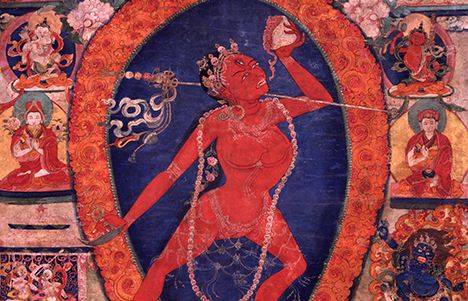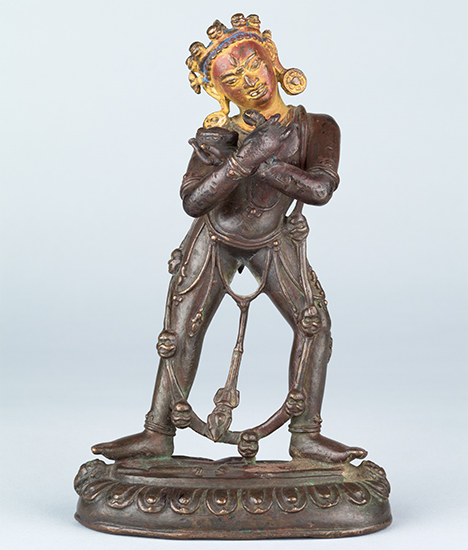
Societal ideas about identity, gender, and sexuality have changed dramatically in recent years, allowing new possibilities for expression. Yet power structures embedded in religions with long-standing spiritual traditions present complex challenges to these new ideas for practitioners and teachers alike.
This spring at the Rubin, Buddhist lama and Harvard-trained theologian Lama Rod Owens met with meditation teacher Kate Johnson as a part of our Compassionate Action series. Together they explored how we can use this cultural moment as an opportunity to liberate our collective conditioning around power, pleasure, gender, sexuality, and consent.
Read adapted excerpts of their conversation below.
On forging your own spiritual path
Kate Johnson: You don’t call yourself a Tibetan lama but a lama who trained with Tibetans. What’s the distinction there?
Lama Rod Owens: I have gone through this period of leaving some of the structures of Tibetan Buddhism, because it actually creates harm for me. It’s an effort to claim the space of being an American tantric teacher. I want to practice Tantra within my cultural context—and from my cultural perspective as a person who is descended from slaves. I have to be me. I think that’s the beginning of creating an authentic practice.
You actually have to become yourself, you know? The risk is, “Will people be interested in me? Will people come to my talks, give me money, give me titles, will I get to come to the Rubin Museum?” These are the things we have to think about. This all lies at the root of how we create harm for ourselves in our communities. If we can’t be ourselves, then it’s more than likely you’re going to be a violent person.
Johnson: What forms do your practice take now that it’s no longer Tibetan?
Owens: It’s still rooted in tradition, but it’s more about exploring what it means to be in this body, in this country, all the things we’re calling upon in our practice. The protectors, the deities, the bodhisattvas, the ancestors . . . I want to bring ancestor practice into it, because I can pray to all these lineage lamas, but I want to pray for the beings who made sure that I was able to reincarnate into this body, to have the privileges I have now. I have been reincarnated into this body that has been dependent upon people like me, who have survived systematic oppression within samsara. I have to honor that.
On the relationship between gender, identity, and spirituality

Johnson: I was reading the book Open to Desire by Mark Epstein, and in the book he talks about psychoanalyst Jessica Benjamin. She discusses, not necessarily female desire, but feminine desire or the Yin form of desire, as a desire for space. And I was reflecting on my own coming into maturity and process of maturing around sexuality. Especially in my teens and twenties, I felt like an object because I was being looked at too closely, and just in terms of my parts, you know? And there’s something about this desire for space and spaciousness that I identify with, in terms of what enables me to feel desire. It’s like there’s a right amount of space, and it’s not so close that it’s picking me apart and reducing me to body parts, but it’s also not so far away that it’s clinical. It’s like desire requires this right spatial relationship. Does that align with the tantric view?
Owens: Yeah, absolutely. I mean, the female principle in Tantra is space. One of the things that’s really powerful about the traditional practices is that you’re going through practices where you’re imagining yourself to be different than what you are in reality. So you’re imagining yourself to be female and male, you know, or through some practices where you’re not gendered at all.
Johnson: And you visualize yourself as this?
Owens: Yeah, there’s a practice with Vajrayogini—she’s a fierce red deity—and you become her, regardless of who you are. You’re just divine, you become the embodiment of a divinity, and that means that there’s a spaciousness you’re entering into. But that spaciousness is actually the experience of suffering, initially. Because you’re trying to disrupt clinging to ego, which is creating the boundaries that we’re living in. For me, when I was moving into that space, I was like, “This is rough.” Because I didn’t know how to relate to boundlessness; I could only relate to boundaries. “This is who I am.”
And then in Tantric deity practices, you say, “You’re not this. Matter of fact, become that, and see what happens.” And that really plays with gender and gender identification. You can come through that like, “Wait, what are my pronouns now?” It had a profound impact on my attraction and how I related to my body. It gave me permission to touch into the feminine experience within my own body and mind. And it intensified pleasure, it intensified eroticism, it intensified how I began to be attracted to many other kinds of people. And it was actually decolonizing my sexuality.

On celibacy and sexual exploration
Johnson: When you make a choice not to engage in sexuality or sex, it doesn’t necessarily feel repressive. It can be a very freeing moment. But for me, it started to feel like this part of me is not welcome. And it was an interesting path to try to integrate that—like, most of our teachers are monastic teachers, how am I going to ask them? You know, that’s rude!
Owens: But I heard such a transformative teaching on sexuality from a Theravada nun that completely blew my mind open, because the renunciation gave her a positionality that helps her to be super objective and not attached to how she explored human sexuality.
Johnson: So she was still exploring sexuality, but as a celibate person?
Owens: Yeah. And several years ago, I used to do this program called Bringing Queerness to the Path, and my teaching partner was a Western monk in the Tibetan tradition. It was just profound, as a layperson, talking about sex, and as a monastic person talking about the expression of sexuality. Sangye was also gay, and he was like, “I’m still sexual though; I’m not having sex but I’m still sexual.”
About the Speakers
Kate Johnson works at the intersections of spiritual practice, social action, and creativity. She has been practicing Buddhist meditation in the Western Insight/Theravada tradition since her early twenties and is empowered to teach through Spirit Rock Meditation Center. She holds a BFA in dance from the Alvin Ailey School at Fordham University and an MA in performance studies from NYU.
Kate is a core faculty member of MIT’s Presencing Institute and has trained hundreds of leaders and changemakers in Social Presencing Theater, a mindfulness and dance improvisation methodology used to inform strategic planning and systems change in our complex world.
Lama Rod Owens is an author, activist, formally authorized Buddhist teacher, and graduate of Harvard Divinity School. He is the co-founder of Bhumisparsha, a Tantric Buddhist practice community, as well as a co-author of Radical Dharma: Talking Race, Love, and Liberation. His next book on anger and love is due out later this fall.

